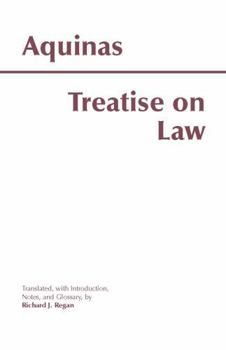Book Overview
St. Thomas's Summa theologiae is often compared to a medieval cathedral because of its sublime construction both as a work of logic and literary architecture. Here is a mere tip of one of the spires,... This description may be from another edition of this product.
Format:Paperback
Language:English
ISBN:0872205487
ISBN13:9780872205482
Release Date:September 2000
Publisher:Hackett Publishing Company
Length:128 Pages
Weight:0.29 lbs.
Dimensions:0.3" x 5.4" x 8.5"
Customer Reviews
1 rating
A Thoughtful Treatise on the Law
Published by Thriftbooks.com User , 17 years ago
St. Thomas Aquinas (c.1224-1274)did not write a specific Treatise on Law. Rather this book edits part of St. Thomas' SUMMA THEOLOGIAE whereby Aquinas made intelligent comments on law. Father R.J. Henle, S.J. did a masterful job in compiling and editing Aquinas' TREATISE ON LAW. A very unique feature of this book is the Father Henle's excellent editing of this book. Father Henle gives readings careful notes to improve reading and understanding the text. He has the English and Latin of Aquinas' text which is a benefit to those who know Latin. Father Henle begins this book with a precise explanation of how Scholastic arguements were arranged. He gives the method of argument and response used in Medieval universities. Father Henle also provides insight how the Scholastic method was used by St. Thomas Aquinas in Aquinas' texts including THE TREATISE ON LAW. 21st. century readers should know how Aquinas defined the law. Aquinas argued that the the law gave each man his due-good or bad. Aquinas begins with view that the law was Natural Law. He argued that the Natural Law could be traced to God's Law since God or the Divine Being (The Unmoved Mover according St. Thomas Aquinas)was the creator of all things including law and civil behavior. Aquinas carefully explained the men obey the law because, as part of God's creation, men were prone to approach the Divine. Or, because of the fact men were not perfect, some men obeyed the law because of the threat of legal sanctions. He offered an interesting view that those who obeyed the law due to legal sanctions could be influenced to see the benefits of the law. The law was positive in that it protected men and promoted social harmony. The law was negative in that men could be legally punished for harmiing "their fellow man." St. Thomas Aquinas also knew that some rulers and some laws were unjust. He stated that an unjust law was not law at all, and those who actively followed an unjust law were not only guilty of wrong doing but were also engaged in evil which offended God. Yet, Aquinas also urged caution and prudence as he realized that few men had a martyr complex. Aquinas would have refuted such "reformers" such as Luther and Calvin. Father Henle has a brief comment in page 230 that Aquinas realizing that men were not perfect, they could be good with the aid of the Catholic Church and desire to be better. G.K. Chesterton had a good comment when he stated that Original Sin did not mean men were derpraved or inherently evil. Chesterton argued that Original Sin meant that men were not as good as they could be which is a view Aquinas shared. Aquinas would have refuted Calvin's view that many of not most men were reprobates and were lost. Aquinas would have disagreed in that men were not hopeless since God created Man. One disagreement that this reviewer has with St. Thomas Aquinas is his statement that a judge was required to impose legal sactions including the death penalty even if the judge knew the de






